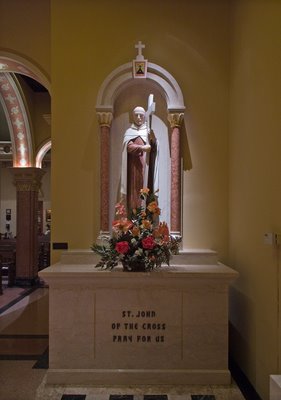 TODAY IS THE FEAST DAY of Saint John of the Cross (June 24, 1542 – December 14, 1591), Spanish Carmelite friar, mystic, and Doctor of the Church. Along with fellow mystic and Doctor, Saint Teresa of Ávila, John founded the reform order of Discalced Carmelites. (Photo taken in the Discalced Carmelite Monastery in Saint Louis County, Missouri.)
TODAY IS THE FEAST DAY of Saint John of the Cross (June 24, 1542 – December 14, 1591), Spanish Carmelite friar, mystic, and Doctor of the Church. Along with fellow mystic and Doctor, Saint Teresa of Ávila, John founded the reform order of Discalced Carmelites. (Photo taken in the Discalced Carmelite Monastery in Saint Louis County, Missouri.)Today, meditation and mysticism seem to be the exclusive domain of either Oriental religions or the New Age, but this is not true. The West has a long tradition of meditation (which comes from a Latin word meaning "measure") and mysticism (which comes from a Greek word meaning "initiate"). These have deep European philosophical roots going back at least as far as Pythagoras and Plato, and in Western religion with the Bible's Song of Songs and Psalms.
Mysticism, as is commonly thought of today, implies fuzzy New Age thinking, indistinguishable from drug-induced delirium. But authentic Western mysticism has a philosophically rigorous basis, even though it is highly subjective. Sadly, the Reformation jettisoned the philosophical framework around much of religion, and so often modern mystics confuse their subjective visions with the Will of God. You often see this when people speak of being "moved by the spirit" in directions that seem heterodox.
Along with much that was beautiful, good, and true in the Church, the authentic, orthodox mysticism of John and Teresa was mainly abandoned back in the 1960s. However, when the Church ignored its mystical patrimony, the vacuum was filled with Eastern, heterodox novelties.
But Teresa and John's writings deserve a revival within Christian circles. John of the Cross' poetry is considered some of the best in the Spanish language, and reads very well in English translation. I'm currently reading Teresa's Interior Castle, and it is awesome and even funny.
Writings of Saint John of the Cross:
- Collected works from the Discalced Carmelites of Austria.
- Christian Classics Ethereal Library, a few works, available in many formats.
- Ascent of Mount Carmel, Dark Night of the Soul, The Living Flame of Love, at EWTN.
- Project Gutenberg, autobiography
- Christian Classics Ethereal Library, in many formats
- Interior Castle, Way of Perfection, Autobiography, at EWTN.
- Letters, from U. Penn.


No comments:
Post a Comment